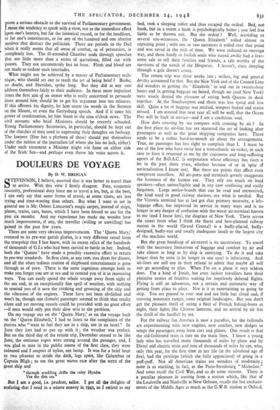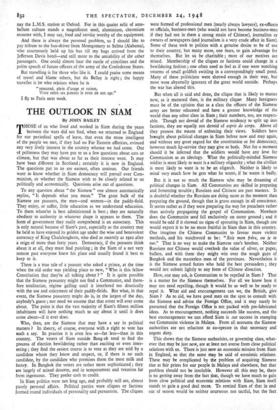DOULEURS DE VOYAGE
By D. W. BROGAN
STEVENSON, I believe, asserted that it was better to travel than to arrive. With this view I firmly disagree. Fate, economic necessity, professional duty force me to travel a lot, but, at the best, I can only say that some forms of travel, at some times, are less trying and time-wasting than others. But what I want to see in general use is Mr. Osbert Lancaster's magic carpet, instead of ships, planes, trains, cars, buses, which I have been forced to use for the past six months. And my experience has made me wonder how much improvement, if any, the traveller (willing or unwilling) has gained in the past few years.
There are some very obvious improvements. The ' Queen Mary,' restored to its pre-war garish glories, is a very different vessel from the troopship that I last knew, with its recent relics of the hundreds of thousands of G.I.s who had been carried to battle in her. Indeed, both the ' Queens' have made a possibly excessive effort to return to pre-war standards. In first class, at any rate, you dress for dinner, and all the often tedious routine of shipboard entertainment is gone through as of yore. There is the same ingenious attempt both to make you forget you are at sea and to remind you of it in reassuring ways. You can easily spend the whole voyage away from sight of the sea and, in an exceptionally fine spell of weather, with nothing to remind you of it save the creaking and groaning of the ship and the vibration of the engines. These have not been abolished and won't be, though one (female) passenger seemed to think that totally silent and yet moving vessels could be provided with no great effort —if men would only put their slow wits to the problem.
On my voyage out on the ' Queen Mary,' as on the voyage back on the Queen Elizabeth,' I had to listen to the complaints of the purists who "want to feel they are in a ship, not in an hotel." In June they just had to put up with it ; the weather was perfect. But on the third day of the return trip, December ceased to be like June, the ominous ropes were strung around the passages, and, I was glad to note in the public rooms of the first class, they were coloured and I suspect of nylon, not hemp. It was for a brief hour or two pleasant to stride the deck, legs apart, like Columbus or captain Bligh ; to see the great waves race after the stern- of the great ship and
"through scudding drifts the rainy Hyades Vex the dim sea."
But I am a good, i.e. prudent, sailor. I got all the delights of Seafaring that I need in a winter convoy in 1942, so I retired to my
bed, took a sleeping tablet and thus escaped the ordeal. Bed, not bunk, but in a storm a bunk is psychologically better ; you feel less liable to be thrown out. But the ordeal ? Well, according to several eye-witnesses, the ' Queen Elizabeth' rolled almost to capsizing point ; with one or two narrators it rolled over that point and was saved in the nick of time. We were reduced to steerage way, and those hardy or foolish souls who stayed awake had a fear- some tale to tell their families and friends, a tale worthy of the survivors of the wreck of the Hesperus. I haven't, since sleeping through a gale doesn't count.
The return trip was three weeks late ; striket, fog and general devilry accounted for that. But the New York end of the Cunard Line did wonders in getting the ' Elizabeth' in and out in twenty-four hours and in getting baggage on board, though we (and New York) were wisely denied the pleasure of seeing both Queens in dock together. At.the Southampton end there was less speed and less skill. Quite a lot of baggage was mislaid, tempers frayed and trains missed. I am assured that next year all will be well, that the Ocean Pier will be back in service—and I am a credulous soul.
How does crossing by sea compare with crossing by air ? In the first place no air-line has yet mastered the art of looking after passengers as well as the great shipping companies have. There tends to be a rather hand-to-mouth air about the arrangements. True, no passenger has less right to complain than I. I must be one of the few who have twice lost a transatlantic air-ticket, in each case to have it returned to me by the courteous and long-suffering agents of. the B.O.A.C. (a corporation whose efficiency has risen a lot in the past three years, whether because of or in spite of nationalisation I know not). But there are points that affect even competent travellers. All air-ports and terminals greatly exaggerate the keenness of the human ear. They rely too much on loud speakers—often unintelligible and in any case confusing and easily forgotten. Large notice-boards that can be read and memorised, the kind used in good railway stations, •are what is needed. But the Victoria terminal has at last got that primary necessity, a left- luggage office, has improved its service in many ways and is no longer in any danger of confusion with the•worst air-terminal known to me (and I know lots), the disgrace of New York. There across the street from what I think the finest and best-planned railway station in the world (Grand Central) is a badly-placed, badly- designed, badly-run and totally inadequate insult to the largest city of the machine world.
But the great handicap of air-travel is its uncettainty. To travel with the necessary limitations of baggage and comfort by air and take almost as long as by ship is annoying. To do it and take longer than by train (a lot longer in one case) is infuriating. And air-lines are still coy in their refusal to admit that maybe all will not go according to plan. When I'm on a plane it very seldom does. I'm a kind of Jonah, but even luckier travellers have their plaintive stories of fruitless waiting for hopelessly delayed flights. Flying is still an adventure, not a certain and automatic way of getting from place to place. Nor is it as entertaining as going by ship. You are pinned to your seat and see little but cloud and, if crossing mountain ranges, some original landscapes. But you don't get the pleasant thrill of seeing a fleet of French fishing-boats at night, their lights like Chinese lanterns, and no arrival by air has the thrill of the landfall by sea.
For the railway fan America is now a paradise, for the railroads are experimenting with new engines, new coaches, new dodges to tempt the passengers away from cars and planes. One result is that the old-fashioned train is rare on the main lines. I know a young lady who has travelled many thousands of miles by plane and by Diesel and electric train and tens of thousands of miles by car, who, only this year, for the first time in her life (at the advanced age, of five), had the privilege (which she fully appreciated) of going in a puff-puff. Not all American trains are wonders of modernity ; none is as startling, in fact, as the Paris-Strasbourg "Michelin." And some recall the Civil War, and so do some stations. There is a peculiar pleasure in starting from a station which, like that of the Louisville and Nashville at New Orleans, recalls the last enchant- ments of the Middle Ages as much as the G.W.R. station at Oxford.
nay the L.M.S. station at Oxford. For in this quaint relic of ante- bellum culture stands a magnificent steel, aluminium, chromium monster with, I may say, food and service worthy of the equipment.
And there is always the personal problem, so I should like to pay tribute to the bus-driver from Montgomery to Selma (Alabama), who courteously held up his bus till my bags arrived from the Jefferson Davis hotel—and still more to the amiability of the other passengers. One could almost hear the rustle of crinolines and the polite speech of future officers of the army of the Confederate States.
But travelling is for those who like it. I could praise some means of travel and blame others, but du Bellay is right ; the happy traveller is he who rejoices when he is "retourne, plein d'usage et raison, Vivre entre ses parents le reste de son age."
I fly to Paris next week.



































 Previous page
Previous page